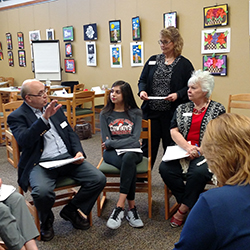By Shyam K. Sriram, Amy Atchison, Elizabeth Bennion, John Forren, Arthur Sanders, John Theis
Abstract
While civic engagement continues to be a buzzword in political science, there is still a lack of discussion about what practices work, and in what context. In particular, are there certain initiatives to engage that do particularly well at two-year colleges versus larger universities? What about colleges with diverse student populations? At the 2014 annual meeting of the Midwest Political Science Association, seven scholar-teachers came together to discuss civic engagement at their respective institutions and to share ideas about what worked. Collectively, we represented a diverse group of institutions, including teaching and research universities as well as multi-campus community colleges. All of us, however, were focused on implementing practices that ameliorated American civic knowledge among students, faculty, staff, and universities as a whole. While some of us focused on global civic engagement and giving students the skills to succeed after graduation, others tailored projects on media literacy, public policy, humanitarian law, poverty, and citizenship.
Innovative Ideas in Civic Engagement across Two-Year and Four-Year Colleges At the 2014 annual meeting of the Midwest Political Science Association, seven faculty members 1 came together to discuss civic engagement at their respective institutions and to share ideas about what worked. Collectively, we represented a diverse group of institutions,including teaching and research universities as well as multi-campus community colleges.Some of us were actively involved with The Democracy Commitment(TDC) and the American Democracy Project(ADP), while others had created and sustained their own independent civic engagement efforts (with varying degrees of institutional support). All of us, however, were committed to enhancing civic knowledge, engagement,and learning,and we had, through trial and error, arrived at core practices that had been successful at our individual institutions. This article focuses on these “best practices” and offers practical ideas for other political scientists who are interested in adapting the related programs, ventures,and events for their own campuses. Each of the six authors briefly discusses a facet of civic engagement education that is most important to him or her,followed by a description of the specific practices he or she highlighted during the panel discussion at the 2014 annual meeting. Shyam K. Sriram, Georgia Perimeter College Of the five campuses comprising Georgia Perimeter College(GPC),the Clarkston campus, about 15 miles east of Atlanta, may be the most unique in terms of cultural capital. Clarkston has been the resettlement point for the vast majority of refugees arriving in Georgia since the 1980s, and this rich local population has led to a very diverse student population. Consequently, it has also created some unique challenges for GPC’s political science faculty. The first challenge was encouraging native-born American students to care about government and instilling in them a belief in their own political efficacy. The second challenge was arming international students, non-native English speakers (NNESs), and other “new Americans” with the tools not only to understand how the American political process works, but to inspire them to think about how the same ideas could be replicated in their own communities and, possibly,exported back to their home countries. This is one definition of “global civic engagement.”1 Peter Levine fromTufts University was also part of the original panel.One project that achieved both of these aims was the fall 2012 Clarkston Public Service Announcement (PSA)Project. Inspired by a similar undertaking at De Anza College, I created an assignment to teach students the basics of videography, film editing, and using Flip cameras and iMovie in conjunction with the MediaSpot, GPC’s media literacy center. The goal was for my students to create short, one-minute-long video PSAs to encourage voter registration in as many languages as possible. Ichose two back-to-back sections of an American Government course and,after asking students about their language fluencies, created “language teams” of four to seven students each,with at least two native-Englishs peakers and one student fluent in another language. Ialso used a college-wide faculty email server to solicit guidance from faculty and staff who would serve as “language consultants.” Ultimately, students would submit videos in eight languages:Tigrinya, Somali, Spanish, Ogoni, French, Amharic, German, and Vietnamese.All of the videos are available through the College’s YouTube channel assignment worked very well for the students and allowed both native-born and immigrant students to collaborate in a multicultural environment to learn about political participation and voting in a hands-on way.The second civic engagement “best practice” was a unique opportunity for students to learn about lobbying during Stop Violence Against Women Day(SVAWD). Held every January during the Georgia legislative session, SVAWD brings together activists from across the state to learn about bills under consideration in the Georgia General Assembly and then to meet with state senators and representatives. Between 2010 and 2012, I accompanied over 100 students to the state capitol to participate in this experience. SVAWD offered students a chance to see how politics worked in practice and learn about the legislative process, lobbying, representation, the basics of deliberative democracy, role playing, and getting to know ones elected officials in person. What made the event extraordinary, however,was the students’ sheer interest and dedication, especially since so many were newly arrived immigrants and thus non-U.S. citizens; yet, as many shared with me in the post-exercise reflection, they felt that the experience had prepared them for citizenship by showing them that they had a role in the state political process. According to one student, a former Iraqi refugee, “I do feel that what we were lobbying for was important because it is my right to do so;I come from a land where tyrants would snatch your rights away if you have any to start with.” Amy Atchison, Valparaiso University In the not-too-distant past, citizens only needed an understanding of how their own societies worked. Today,the complexities of international interdependence demand that people gain at least some understanding of how global society functions. Therefore, civic education must expand to include global governance and explore what it means to be a member of a global community. At Valparaiso University, internationalization of the curriculum is one of the campus’primary goals as faculty, staff, and administrators work to achieve the university’s mission students to lead in church and society. Faculty are encouraged to try new ways to bring international perspectives to the campus community. In response, a group of faculty members have started an international humanitarian law (IHL) peer-education program in partnership with the American Red Cross and its International Humanitarian Law Action Campaign(IHLAC) program. The IHLAC is based on the premise that peer-led education is an effective method of reaching young people. Each participating Red Cross chapter recruits team leaders who are responsible, in turn,for recruiting and training an Action Campaign team. The team develops an interactive program to educate their peers about IHL. The team then presents its program on campus and in the community. Valparaiso University joined the IHLAC in its second year, 2013. The project began with the recruitment of team leaders, followed by a training in IHL using Raid Cross, an experiential curriculum initially developed by the Belgian and French Red Cross societies. Through the six Raid Cross simulations, students were introduced to the four main principles of IHL: distinction, military necessity, proportionality, and avoiding unnecessary suffering. Each simulation presents a different aspect of war, such as internment in a prisoner of war camp, evacuating wounded soldiers from a battlefield, the difficulties of delivering humanitarian aid, the challenges soldiers face in distinguishing between military and civilian objects, the decisions military commanders face during war, and the prosecution of war criminals in the aftermath of war. Team leaders then recruited their teams and worked with them to develop action campaigns. One team developed an interactive video/game that forced players to decide whether or not they would recruit, train, and use child soldiers in warfare; the other developed a Monopoly™-style board game called Consequencia, in which the warlord who is given the lightest sentence at The Hague wins the game. The outcomes have been remarkable on a number of levels. First, the two teams reached more than 300 people through these campaigns, educating them about both illegal use of child soldiers and the international criminal justice system. Second, given the success in the first year, we successfully partnered with the local Red Cross chapter to secure a grant to continue the program in the 2014-2015 academic year. During the 2014-2015 campaign, the students formed only one team and chose to educate peers about refugee law and the plight of refugees by building a simulated refugee camp and by interviewing Valparaiso University students who were once refugees. This campaign reached more than 600 people. Finally, on a more individual level, many of the participants have pursued IHL research projects in their capstone classes, and two students are applying to graduate schools in which they plan to continue their IHL studies. Elizabeth Bennion, Indiana University South Bend Recent developments in neuroscience and the scholarship of teaching and learning demonstrate the value of experiential learning. Civic engagement is both an end and a means. Students in the community are engaged to develop the knowledge, skills, and values required to remain actively engaged beyond graduation. Indiana University (IU) South Bend, a regional, comprehensive university with over 7,000 students, has accomplished this in numerous ways, including training students to become door-to-door canvassers for a non-partisan voter registration drive, training students to register voters in college classrooms, working with students to host public forums and candidate debates on campus, and matching students with community partners for a wide variety of service-learning projects. One unique project at IU South Bend that has successfully created real and sustained change in student-citizen efficacy is a weekly public affairs program called Politically Speaking, which is broadcast live each Sunday to a 22-county area containing 1.2 million viewers. As part of the program, interviews are conducted with national and state legislators, along with local politicians, academics, practitioners, and political activists, on topics as diverse as the Indiana General Assembly, the Michigan Legislature, and contemporary policy issues such as education reform, drug policy, school safety, gun control, immigration policy, health-care reform, same-sex marriage, and domestic violence. This high visibility partnership between IU South Bend and the local public television station includes the creation of a political science research team as part of a three-credit applied research seminar. Employing students as researchers, call screeners, episode critics, and amateur videographers,my work on the TV show is a way to further the civic education and engagement mission of IU South Bend’s Department of Political Science, the American Democracy Project, and the campus, while increasing the university’s visibility of the, promoting student learning, and strengthening campus-community partnerships. Students research featured topics, write episode reviews, produce “fast facts,”screen viewer calls, and produce short videos featuring area residents.The seminar offers students a rich hands-on experience creating a live public affairs program, and relies upon students for ideas, research, and feedback as they learn about a wide variety of policy issues they may have never considered, gain tangible research and media production skills, and experience the joy of seeing the results of their efforts aired live each week. This approach to learning uses the experience of civic engagement to promote lifelong civic knowledge, skills, and dispositions among students. Students in the “Politically Speaking: Make Live TV” course illustrate the value of this approach to learning. Post-course reflections indicate students’ satisfaction with being able to share their learning with others. Students appreciate the ability to “learn about the newest and most current issues that are happening in [their lives], state, and city,” noting that course topics were “relevant” enough to provoke out-of-class conversations and even to “go home and discuss with family.” They have also raved about the opportunity to develop “research skills that cannot be simulated by other courses” and to conduct research that “directly impact[s] the real life public policy debate.” In sum, students appreciate the value of this learning experience both because of the skills they gain and because these skills can be documented, utilized, and appreciated by people outside the academy. Moreover, as a result of their participation,they often express their intention of following policy debates more closely and becoming more actively engaged in the political process in the future.John Forren, Miami University Hamilton Consistent with its identity as an “open admission”commuter campus, Miami University Hamilton(MUH) has maintained an especially robust methods in creating a stronger civic engagement culture at many more colleges and universities.


